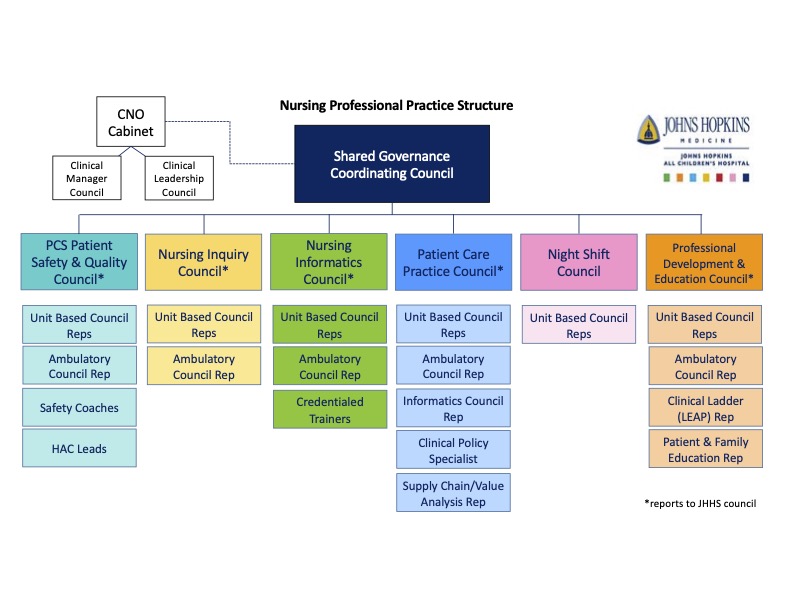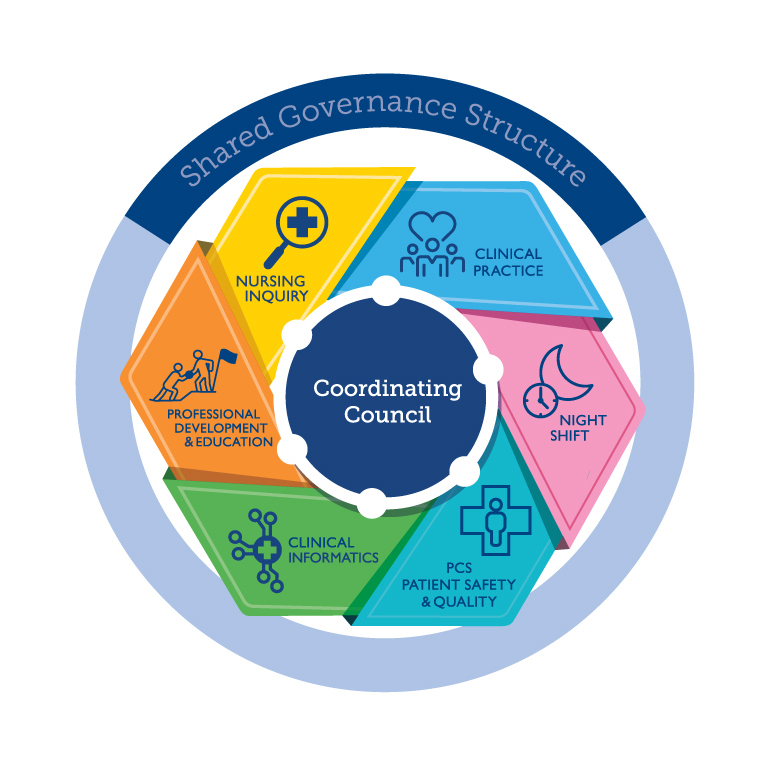Programs and Councils
Nursing programs and councils at Johns Hopkins All Children’s Hospital promote nursing excellence, safe nursing practices, and the best possible outcomes for our patients and families. The programs and councils work in partnership with the hospital’s leadership teams to improve quality of care, safety, and to enhance work life.
Patient Care Services Shared Governance
At Johns Hopkins All Children's Hospital, the shared governance structure engages clinical nurses to create solutions around issues in clinical practice, quality improvement, professional development and nursing research. Unlike a traditional or typical decision-making hierarchy, this model shares responsibility and accountability across all levels of our Patient Care Services division to provide equal power, authority and decision-making. The benefits of shared governance become evident through clinical nurse empowerment and an increased sense of ownership by nurses and clinical staff. In turn, these promote individual and group motivation, development of new knowledge and skills, and greater employee satisfaction. This supports recruitment and retention of outstanding staff. All these benefits of the shared governance model enhance the quality of care, resulting in improved outcomes and increased patient and family satisfaction.
The chief nursing officer (CNO) is accountable for the professional practice of nursing at Johns Hopkins All Children’s and executes the responsibilities for the operation of nursing practice and the delivery of nursing care through its shared governance philosophy and structures.
Unit-based councils address professional practice issues that are unique and relevant to unit operations. House-wide councils address areas of common interest and significance in collaboration with the broader interdisciplinary team.
Nurse autonomy is supported and promoted through this shared governance model. Clinical autonomy at Johns Hopkins All Children’s gives nurses the authority and freedom to make nursing care decisions within their full scope of practice in the clinical care of their patients within interprofessional practice environments. Nurses also demonstrate organizational autonomy and have the authority and freedom to be involved in broader unit, service line, organization or system decision-making processes pertaining to patient care, policies, procedures and the work environment.
Shared Governance Benefits:
- Shared responsibility and accountability at all levels
- Improved quality of care, resulting in increased patient satisfaction and improved outcomes
- Equally shared power, authority and decision-making
- Increased staff motivation
- Increased sense of ownership by nurses and clinical staff
- Front-line empowerment
- Development of new knowledge and skills
- Increased employee satisfaction, which helps with recruitment and retention
Shared Governance Goals:
- Improve quality
- Recognize and promote the voice of the staff
- Support staff awareness and involvement in unit-based and hospital-wide decision-making
- Implement our nursing strategic plan through the council model
Nursing Professional Practice Structure

The CNO Cabinet is composed of all clinical nursing directors, the director of professional practice, the director of clinical informatics, the chair of the manager council and the director of respiratory therapy. Membership may be adjusted by the CNO as deemed necessary. The purpose of the CNO Cabinet is to establish the strategic direction of Johns Hopkins All Children’s nursing. It is a forum for proactive identification, resolution and development of programs, projects and issues related to clinical quality and safety, nursing professional practice and research. The CNO cabinet is also accountable for the development of the strategic and operational plans, including biannual goals, and monitoring and evaluating the effectiveness of nursing programs.
The vision of the Manager Council is to be transformational leaders by engaging others through connection, clear communication and motivation for professional excellence. The council nurtures a culture of inquiry and innovation by empowering nurses to exercise control of nursing-related issues, evidence-based practice and collaboration with their interdisciplinary colleagues. They embody the vision, mission and values of our organization. The council will collaborate as a team to streamline daily operations, finances and budget, and play an integral role in the strategic goals.
The Shared Governance Coordinating Council coordinates, integrates and monitors the activities of the hospital’s nursing shared governance councils and mediates unresolved issues within or between councils.
The Patient Care Services Patient Safety and Quality Council consists of frontline clinicians, Clinical Nurse Leaders (CNLs), and Patient Safety & Quality advisers. The purpose of this council is to report and identify improvement opportunities intended to promote an environment of safe practices and to work collaboratively to prevent potential harm to our patients and families, staff, and visitors.
The Professional Development & Education Council assists in both the development and support of staff education and professional development. This council ensures the sustainability of educational needs identified in the shared governance structure throughout the Johns Hopkins All Children’s health system. These educational and professional development needs are identified within the structure by evaluating trends and identifying educational needs from the other councils, quality, risk management, and education initiatives.
The Nursing Inquiry Council educates, mentors, and supports frontline staff to use current relevant evidence along with patient preferences and values to promote evidence-based practice across the organization. The council also serves as a resource for nursing research and evidence-based practice projects within the organization.
The Patient Care Practice Council assists in the development and sustaining of a professional practice environment in which clinicians will retain and enhance influence over decisions that impact practice, professional development, self-fulfillment and the work environment. It is the responsibility of the council to foster and coordinate the work of the unit-based practice councils.
The Clinical Informatics Council serves as a forum for optimization, innovation and integration of the electronic medical record to promote the needs of the patient during care delivery and clinical practice.
The Ambulatory Council serves as a forum to unite, standardize and have a voice for nurses across the broad spectrum of ambulatory services. Ambulatory representatives participate on all house-wide councils to ensure that the scope of services outside of the hospital is well understood. They also make sure suggestions for ambulatory practice are considered when decisions are made regarding nursing practice, professional development, nursing research and evidence-based practice, and informatics.
LEAP Clinical Advancement Program
Introduced in 2013, the Ladder for Excellence and Advancement in Patient Care Services (LEAP) is a voluntary four-tier clinical advancement program for full- and part-time multidisciplinary professionals in clinical practice at Johns Hopkins All Children's Hospital. It promotes professional excellence in all areas of the professional practice model and recognizes professional growth and development, rewards achievement, enhances employee satisfaction, and contributes to recruitment and retention of qualified employees.
Registered nurses and respiratory therapists involved in direct patient care in either the inpatient or outpatient setting may apply for levels one through four. Before applying, registered nurses and respiratory therapists must meet the initial eligibility requirements and plan their professional practice demonstrations over a one-year period. Each submission is reviewed quarterly by a peer committee. Participants submit a scorecard that reflects their accomplishments over the previous quarter. The LEAP program is reviewed at least every two years for relevance, rigor, and any changes that need to be made to the program.
Pediatric RN Residency Program
The Johns Hopkins All Children's Pediatric RN Residency is an ANCC Accredited with Distinction Transition to Practice Program, which provides a 12-month foundational program for the new graduate or eligible nurse. This program supports the growth into a pediatric professional practitioner.
Didactic classes are accompanied by preceptor-led orientation to the unit of hire, unit-specific classes and training, looping opportunities to other hospital departments and services, simulation, a mentor program, clinical debriefings and support time/self-care sessions. All new graduate nurses are expected to actively participate in the RN Residency Program.


